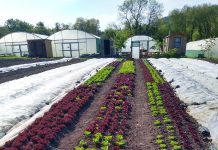Every year is different. After a hot and dry June and July, we expected the usual wet and dismal school holidays. But no, you can never gainsay the weather.
This year we have been scrabbling around for tomato recipes, as the yield, especially from outdoor plants, has been great – and no blight on them yet. No blight! Amazing!
All the late summer fruits from perennial plants are in abundance, such as blackberries and figs. Apples haven’t done so well, partly due to the freezing winds in late March.
So long as you have had access to water, most vegetable crops have done well this summer, although many plants would have preferred rain to applied water. The same goes for the vermin, which have been attacking unexpected crops.
Now we’ve passed the Equinox light levels and soil warmth are falling fast, and we look to our winter vegetables. These still look a little small, but will swell now there is less evaporation.
Brassica have done well from a mid-June sowing in modules. It was a job to keep the modules wet enough, twice daily watering needed, but this allowed us to pick broad beans and peas before transplanting the winter cabbage and sprouts. Cabbages are good at getting enough water out of dry soil, the transplants were watered in thoroughly and nothing since, Enviromesh helped.
There is the question of whether to lift crops or leave them in the soil. We prefer leaving them in, as the taste is always better, but you must expect wildlife to take its toll. We are hoping that our root-fly-free carrots, grown under Enviromesh for the first time, will have less slugs and earwigs going in where the root fly has broken the skin. Time will tell. And how does an elephant get out of a tree? It sits on a leaf and waits till Autumn.
What to sow now:
If it stays mild, outdoors you can still risk sowing hardy crops of rocket, Mizuna and mustards—even turnips. Plant your garlic and overwintering onion sets as usual, as they work on day length. Aquadulce broad beans should grow too big before midwinter or the stems rot, so we will wait until November to plant. Or rather, we will plant in modules in the greenhouse and transplant later to avoid rodent attack.
In the polytunnel you can sow carrots for April/May cropping, and a variety of salad crops, which will grow faster and crop more heavily than outdoors. Spinach Lazio and lettuce Little Gem and Red Grenoble sown in modules in early August, then transplanted under tomatoes, have been yielding heavy crops of leaves already. Until the hens got in, that is! Sowing salads in early October is late, but you should be able to start picking by next February.








